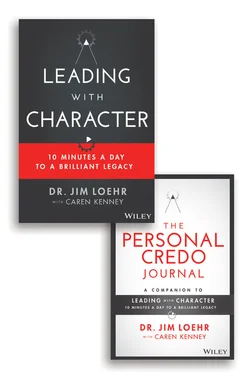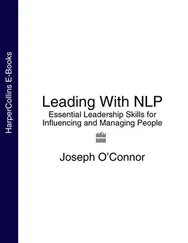The sum total of the countless moral decisions a leader makes every day – trying to do and say the right thing – defines his or her legacy and that of the company or organization that he or she represents.
A leader's ability to make sound moral and ethical judgments and follow through on them, time and again, forms his or her character. Corporate governance should (but often does not) value this ability at the highest level.
Character is not static but a muscle that can – and should – be continually strengthened and reinforced. Leaders who recognize this dynamic make the investment of time and energy, thereby creating the path to a meaningful legacy, one that transcends their careers and lives.
The purpose of this book is threefold:
1 To expose the ingenious ways that leaders knowingly and unknowingly cross moral and ethical lines to get their personal wants and needs met.
2 To prevent leaders from defaulting to reflexive, automatic decisions of a moral nature by raising awareness about the conscious or unconscious processes they are likely using to render these decisions.
3 To provide leaders with a proven method for building a strong and meaningful life and leadership legacy by constructing a robust Personal Credo. This will become their source code for vetting all their future ethical decisions, thereby protecting and bolstering their own legacy and that of the organizations they lead.
Issues of morality and ethical character are profoundly complex. Look no further than the intersection of morality and politics. Take a moment to ponder each of the following words or phrases.
Abortion
Activist judges
Capital punishment
Climate change
Conservatism
Duty
Exceptionalism
Fossil fuels
Gateway drug
Gun control
Immigration
Legalization of drugs
Liberalism
Mass incarceration
Multiculturalism
Open borders
Pacifism
Patriotism
Right to life
Right to protest
Sanctuary cities
Terrorism
The American flag
Do any of these words or phrases produce a strong, visceral reaction in you? To what extent are these political/cultural issues indistinguishable from moral issues? As a quick exercise, pick the three phrases from the list above where your gut reaction was strongest. Now reflect on these questions:
Can you pinpoint the origin of your intense emotional response?
How convinced are you that your gut response is right? Have you ever considered that your gut might be wrong?
Are your reactions based on facts or feelings? Do you consider what your gut tells you to be a personal belief or a verifiable truth? If you consider it to be a verifiable truth, how knowledgeable are you of all the facts on both sides of the issue?
What's the chance that your gut response could ever be reversed? How about when you're confronted with contradictory evidence?
Do you uniformly respect the intellect, experience, and character of those on the same side of these issues as you, and who believe as strongly as you do?
Do you know people who feel just as strongly as you do about such issues but in the exact opposite direction? What makes you sure that your judgment is right and theirs wrong? Do you respect their intellect, experience, and character, though you strongly disagree with them?
Questions like these point to one of the flaws in our moral operating system. When our beliefs are false yet loaded with powerful emotion (as they so often are), they masquerade as fact-based truth. Given the fundamental unsoundness of our beliefs, our moral reasoning and decision-making can become tragically derailed. Political issues, which often trigger red-hot emotions, serve as vivid examples of this operational flaw. The combination of personal beliefs, ideology, and strong emotion can completely overwhelm our capacity for rational thought and sound judgment. Once we declare a belief to be unfettered truth, we close the door to introspective inquiry. Rather than using our powers of reason to investigate weaknesses and inconsistencies in what could well be a faulty belief, we instead use our capacity for creative logic to garner support for what our gut tells us to believe. Once a belief is successfully dressed up as truth (e.g., to succeed in business, it's necessary to cross moral lines; kindness and compassion in the business world are signs of weakness; most people cannot be trusted; accomplishing the mission is more important than how we accomplish it; etc.), we feel justified in whatever moral judgment or decision we render. When we detect no problem in our moral machinery, we see no reason to expend energy to rebuild it. Instead, we march forward, trusting that the coordinates in our moral GPS have all been punched in correctly; and if that's so, then how can we possibly not lead lives of integrity, honesty, trustworthiness, and courage? And when the system fails, and we as leaders find ourselves having breached previously sacred moral boundaries (often repeatedly), we are shocked and mortified. “How did I get here? How could I let myself do this? This is so not like me!”
From the work we have done with extraordinary colleagues and clients at the Johnson & Johnson Human Performance Institute (HPI 1 ), we came to understand that “leading with character” is not an instinct; it is not a natural human response. You needn't have read Darwin to know that it is natural and instinctual to put ourselves first, to get our needs and wants met before those of others. Me first: That's precisely what the morality system we all inherited is programmed to consider. Becoming a leader where morality – in short, our treatment of others – is afforded the highest priority demands a trained response, one that requires dedicated energy investment throughout our lives.
For more than a decade at the Institute, we have searched for a practical method to build and maintain a robust personal morality system for leaders to address the inherent flaws in their morality operating system.
We believe we have found that method. This book, along with the accompanying journal, provides the map.
Most leaders go their entire professional lives without an intentionally crafted, deliberately constructed Personal Credo. (Indeed, far too many leaders don't even realize that something very big and important is missing from their lives). To answer this need, and to address other issues critical to any leader at the dawn of the third decade of the first century of the second millennium, we have included a highly scripted, easy-to-follow program of daily journaling – 10 minutes a day, for three months. Current and future leaders who are brave and committed enough to follow this program, who are intent on creating a brilliant legacy for themselves and their organizations, will find that it raises moral awareness – specifically, how moral decisions are made and how self-serving motivations too often drive them. It also provides a concrete method for building one's own Personal Credo, as well as specific strategies for strengthening 50 character competencies that form the basis of strong character and, hence, a brilliant legacy.
The potential value in daily, self-reflective writing cannot be overstated. In all our years working with people on such exercises, no one – not one person – has come away saying she or he was unchanged for the better; for most people, the experience is life-changing. Building the habit of thoughtful, goal-oriented journal writing brings extraordinary value and produces a trove of life-altering insights. And the benefits begin accruing almost immediately.
A warning: This focus on character and legacy is not for the faint-hearted. It may be one of the most difficult challenges you will ever embrace. If you're concerned, my response to you is exactly what it has been to the thousands of leaders we have worked with:
Читать дальше












